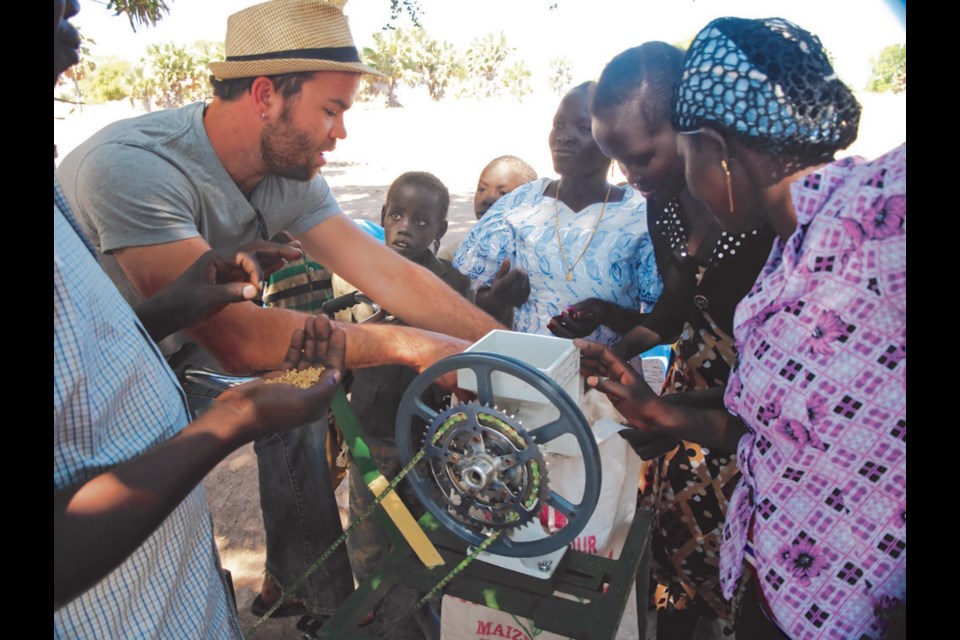When Chris Hergesheimer’s pedal-powered organic flour milling business was about to go under, his brother, Josh, proposed a wild idea: take the bike mill to Africa.
Chris took Josh up on the suggestion, and the two brothers set out on a harrowing journey overland and by air to a small village in South Sudan. The final destination was the town of William Kolong, one of the famous Lost Boys, who fled his home country on foot, came to Canada as a refugee and became a family friend of the Hergesheimers.
The two recently published The Flour Peddler, A Global Journey Into Local Food From Canada to South Sudan, which chronicles their journey. The authors will be in Burnaby on Monday, May 25, from 6:30 to 8 p.m. at the Bob Prittie Metrotown library branch. Admission is free, but space is limited. Register by calling 604-436-5400.
Q&A:
Can you briefly explain how this flour peddling device works?
CHRIS: The machine itself actually began as a regular hand-crank mill, and we used that for a number of years at the farmers’ market and then decided it would be more efficient to hook it up to a bicycle. Our original prototypes involved the flour mill bolted onto a box and belt passing from an exercise bike to the flywheel of the mill, and that just driving itself. Whole grains in, whole grain flour coming out.
What was driving the idea behind your business?
CHRIS: The original inspiration for that, the business itself, was not to go out there and to start a business. It was to get out there and talk to people and get some conversations going about where the grain and flour we consume is coming from and look at the global food system and the global grain trade through a more critical lens.
William Kolong is known for starting a homework club for refugee kids in New Westminster, and he’s since returned to his country to do aid work. Can you tell me a little bit about how your family knows William?
JOSH: William came to Canada as a refugee from South Sudan, … and eventually ended up in New Westminster. And the church where my father works, he came to the church, so we started a relationship through that. Chris and I were one of the first people to meet William, and we took him to get a bank account, we took him to the dentist – all the things we take for granted. He needed someone to walk him through that process. So we knew him since were 19 or 20.
CHRIS: In the same way we helped William learn the ropes a little bit here and helped smooth that transition, when we arrived there, knowing he was there and being able to work within his connections, and control that situation, it was really the only reason it worked out, having him on the ground.
How did you think the bike mill would help in South Sudan?
CHRIS: When we used to talk to William, he used to talk about how women spend hours pounding the sorghum. They have a stick and a bowl, and they pound it. Then they have to take it out and dry it in the sun, so it could crack again. And his idea, he said, “You could really save someone a lot of time doing this.” There’s the potential if girls aren’t having to spend a lot of time producing the family food that they could go to school, they have other opportunities.
CHRIS: The machine itself, if used right, can enable them to produce surplus. With the traditional method, you’re just producing what you eat for your family.
You two describe a very harrowing journey in the book, and there was even some kind of attempted coup at the airport. What was the scariest part of the trip?
CHRIS: For me, being caught up in the politics and the potential for violence. We certainly weren’t in direct danger at any point, but for me, being the first time in Africa, and the unknown, how quickly things can unravel from drinking beers the night before and laughing and having a good time to that situation.
What was the most uplifting part of the trip?
CHRIS: Hearing those ladies laugh and joke around with each other as they tried to ride this bicycle mill and figure out how that was going to work and be able to try and experience something new, that was certainly out of their normal realm of day to day, I think just recognizing that and seeing there was the potential there.
What did you learn from this experience?
JOSH: I guess it’s one of those things you know if you’ve ever been to any country in Africa, is that if you show up and you really make an effort to talk to people, and you say, “Here’s what I need,” they’ll find a way to make it happen. … So much of life in those countries in Africa is about trying to make things work in a place where things don’t work.
What’s next for the Flour Peddler project? Are there going to be more bikes?
CHRIS: We hope to get two or three more mills over to South Sudan. The question is: Do we invest more there or do we try some new places? I think we just have to wait and see, but we’re looking for people who want to be partners with us on this. It’s a small amount of money to create a machine that can really make a difference, both from a business perspective and from a food security perspective.
The Flour Peddler is published by Caitlin Press and is now available in bookstores. To contact the brothers, visit continuouscycle.ca.



